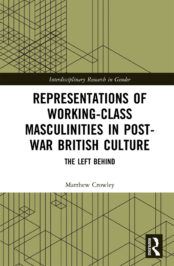When considering his main subjects, author Matthew Crowley emphasizes that there are many different ways to live a certain working-class masculinity, as there never was just one single “traditional” experience or one simple, unified path that would lead to such an experience for every English male working-class person in the mid-20th century.
In his study he offers “… an analysis of representations of white, heterosexual, working-class masculinities in British culture between 1945 and 1989 to trace the development of the sociocultural and material conditions that shaped the masculinities which are helping to shape contemporary culture.”
 Basically the role of the ‘male breadwinner’ as the central pillar of a more or less content and prosperous English working-class is under examination here; this also means if that role ever changed, it would have massive negative repercussions. Particularly in the days of Thatcher, when by “… the mid-1980s the societal structures upon working-class masculinities had previously been founded were critically undermined.”
Basically the role of the ‘male breadwinner’ as the central pillar of a more or less content and prosperous English working-class is under examination here; this also means if that role ever changed, it would have massive negative repercussions. Particularly in the days of Thatcher, when by “… the mid-1980s the societal structures upon working-class masculinities had previously been founded were critically undermined.”
Crowley, a London-based writer and researcher, with this combined kit of theories developed by Bourdieu, Foucault, Benjamin and Raymond Williams lists a large number of source texts for his examination. They are works of fiction and consumer products – such as popular music of the mid 1960s – that naturally serve as both product and representations (and as long as fictional characters are concerned) and personifications of a continuously changing idea of working-class masculinity over the decades in England.
The music he analyzes is that of the Beatles, a band that according to him “appear to embody the ‘working-class’ moment … who kept their accents, acknowledged their roots.” The works of fiction he treats are – among many plays, short stories and novels he refers to – mostly Look Back in Anger, the movie Alfie, and the celebrated 1980s TV production(s) The Black Stuff/Boys from the Blackstuff.
Quickly, several examples of a mostly aggressive and irrational sort of masculinity are presented by spotlighting, for example, the fictional characters of Alfie Elkins or Yosser Hughes (Black Stuff). Generally, the way these characters (and there are several more mentioned here) behave towards women, their reckless, self-serving, and above all totally uncritical conceptions of themselves is one of the main aspects of the study.
That, however, may lead some readers to believe that all (real and fictional) male working-class characters are chauvinists and basically unfit for life, in a way and that such a characterization is very much realistic. This may not appeal to all readers and fellow researchers, as such stereotypes are rather easily unveiled. Today, they are subsumed under a somewhat worn out and highly controversial – some would argue ridiculous – term “toxic masculinity.”
Crowley’s historical outline in basically the first three chapters is very accurate and sums up facts, if condensed and not exactly new, when it comes to the several stages of working-class adaptations, the “Angry Young Men” and “kitchen sink drama” period and the many social changes during the consensus and after. This covers stages with a prospering economy and lots of jobs, as well as desolate times with massive unemployment (as is the case in The Black Stuff) and the destructive outlook it had on the psyche of millions of formerly employed working-class men; whose existence was strongly linked to their occupational status.
The book provides many links to either leftist views and historical developments or social change in England of a more conservative nature, while Crowley devotes an entire chapter to the “New Right” of the 1980s. Always looking for connections to gender, altered male self-esteem and hence changing aspects and traditions of working-class masculinities.
So a number of aspects regarding an urge “to change the system,” mostly associated with socialist ideas and actions carried out by several characters in movies and novels, receive a lot of attention here.
But then, the book’s subtitle is “The Left Behind,” and it has a couple of meanings, one suggests forms of leftist ideas as found in the working-class; since once the terms Labour Party and working-class were almost synonymous.
Altogether a smart analysis of the shifting character (and final downfall) of the ideas of independent masculinity as connected with working-class ethics.
At times, mostly in his conclusion, Crowley’s otherwise impressive text may confuse a few readers who expected maybe a more unbiased research and fewer personal opinions.
Review by Dr. A. Ebert © 2020
Matthew Crowley. Representations of Working-Class Masculinities in Post-War British Culture: The Left Behind. (Interdisciplinary Research in Gender), Routledge, 2020, 186 p.
